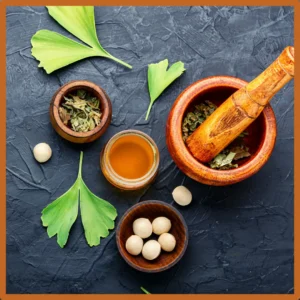Ginkgo Biloba and Tinnitus Relief
Tinnitus, the ringing or buzzing in the ears, can be a frustrating and constant companion. Many seek relief through natural remedies. Let’s explore the science behind Ginkgo biloba and tinnitus, helping you make informed decisions about your hearing health.
What is Tinnitus?
Tinnitus is the perception of sound in the head or ears without an external source. People describe it as ringing, buzzing, hissing, or clicking.
Who Experiences Tinnitus?
Tinnitus is common, affecting 10-25% of adults. It can occur at any age but is more frequent with age.
Causes of Tinnitus
The exact cause of tinnitus is often unknown. Potential causes include:
- Damage to inner ear hair cells
- Earwax buildup
- Head injuries
- Certain medications
- Dehydration
- Hearing Loss
Symptoms of Tinnitus
The main symptom is hearing sound in the absence of an external source. The sound can be constant or intermittent, varying in volume and pitch. Other symptoms include hearing loss, trouble concentrating, and difficulty sleeping.

Ginkgo Biloba: An Ancient Herb
Ginkgo biloba, often called the maidenhair tree, is one of the oldest living tree species on Earth, dating back over 200 million years. This resilient tree is native to China and has been used in traditional medicine for thousands of years. Today, it is a popular herbal supplement in the United States and Europe, and it is known for its potential health benefits.
Historically, it has treated various ailments, particularly blood disorders and cognitive issues. Traditional Chinese medicine employs its leaves and seeds to improve blood circulation and enhance memory. In modern times, the focus has shifted to using Ginkgo biloba extract, derived from the leaves, as a natural remedy for various health conditions.
Benefits of Ginkgo Biloba
Improved Blood Circulation
One of the primary benefits of this plant is its ability to improve blood circulation. The herb dilates blood vessels and reduces blood stickiness, which enhances overall circulation. This improved blood flow can help deliver more oxygen and nutrients to various body parts, including the brain and the extremities. Better circulation benefits cardiovascular health and may help in conditions like intermittent claudication, where blood flow to the legs is restricted.
Antioxidant Properties
Ginkgo biloba is rich in flavonoids and terpenoids, which are powerful antioxidants. These compounds combat free radicals—unstable molecules that can damage cells and contribute to aging and diseases such as heart disease, cancer, and Alzheimer’s. By neutralizing free radicals, it helps protect cells from oxidative stress and inflammation, potentially reducing the risk of chronic diseases and supporting overall health.
Theories Behind Ginkgo Biloba’s Benefits for Tinnitus
The plant might benefit tinnitus sufferers through several potential mechanisms:
Improved Blood Flow
Ginkgo biloba can enhance circulation and improve blood flow to the inner ear. The inner ear relies on a rich blood supply to function correctly, as the tiny hair cells responsible for hearing need adequate oxygen and nutrients. Improved circulation could help maintain the health of these hair cells and prevent damage that might lead to tinnitus.
Antioxidant Properties
Ginkgo biloba’s antioxidant properties may also protect the inner ear. Free radicals can damage the delicate structures within the ear, potentially contributing to tinnitus. By reducing oxidative stress, Ginkgo biloba might help preserve inner ear health and reduce tinnitus symptoms.
Neuroprotective Effects
Ginkgo biloba may have neuroprotective effects, which could help protect nerve cells in the auditory system. This protection might reduce the perception of tinnitus by preventing or minimizing damage to the nerves involved in hearing.
Impact on Neurotransmitters
Some early research suggests that Ginkgo biloba may influence neurotransmitters in the brain, affecting tinnitus perception. Neurotransmitters are chemicals that transmit signals between nerve cells, and modulating their levels might help reduce the auditory sensations associated with tinnitus.
Research on Ginkgo Biloba and Tinnitus
Studies examining Ginkgo biloba’s effectiveness for tinnitus have yielded mixed results. While some research shows promise, particularly with the standardized extract EGb 761®, more studies are needed to draw definitive conclusions.
Key Findings:
Combination with Antioxidants: A study found that the plant, combined with antioxidants, significantly improved tinnitus symptoms.
Potential Side Effects of Ginkgo Biloba
It is generally well-tolerated, but some people may experience side effects, including:
- Stomach upset
- Headaches
- Skin reactions
- Dizziness
Precautions
Specific individuals should take precautions when considering Ginkgo biloba:
- Blood Thinners: Avoid Ginkgo if you are taking blood-thinning drugs, as it may increase bleeding risks.
- Surgery: Stop taking Ginkgo 1 to 2 weeks before surgery or dental procedures.
- Epilepsy, Diabetes, Pregnancy/Nursing: Avoid Ginkgo if you have epilepsy, diabetes, or are pregnant/nursing without consulting a doctor.
Drug Interactions
Ginkgo may interact with various medications, including:
- Seizure medications
- Antidepressants
- Blood pressure medications
- Blood-thinning medications
- Diabetes medications
Is Ginkgo Biloba the Miracle Cure?
It shows promise but is not a miracle cure for tinnitus. Research is inconclusive, and effectiveness can vary based on individual factors.
Key Points:
- Complementary Approach: Ginkgo might complement other tinnitus treatments like sound or cognitive-behavioral therapy.
- Natural Option: It can be a natural alternative for some, but consultation with a doctor is essential.
Other Treatment Options for Tinnitus
While Ginkgo biloba offers potential benefits, several other treatment options can help manage tinnitus symptoms.
Hearing Aids
Hearing aids can be beneficial, especially for those with hearing loss. They amplify external sounds, making tinnitus less noticeable and improving overall hearing clarity. Many also have built-in sound therapy or other tinnitus-helping options.
Learn more about the best hearing aids for tinnitus.
Sound Therapy
White Noise Machines: These devices produce background noise that helps mask tinnitus sounds.
Neuromodulation: Specific sounds or music stimulate the auditory system, potentially reducing tinnitus perception.
Relaxation Techniques
- Stress Management: Techniques like yoga, meditation, and deep breathing promote relaxation and improve coping mechanisms.
- Cognitive-Behavioral Therapy (CBT): CBT helps change negative thought patterns and emotional responses associated with tinnitus, leading to better management.
Dietary Changes
- Sodium Reduction: Reducing salt intake can help manage fluid retention, potentially easing tinnitus symptoms.
- Caffeine and Alcohol: Limiting or avoiding these stimulants might benefit some individuals.
Other Approaches
- Tinnitus Retraining Therapy (TRT): Combines sound therapy with counseling to help habituate the brain to tinnitus, reducing its perceived loudness and annoyance.
- Medications: Doctors may prescribe medications to treat underlying health issues like high blood pressure and anxiety.

The Role of a Hearing Professional
Always consult a doctor or audiologist before starting any new supplement or treatment for tinnitus. They can evaluate your condition, discuss potential benefits and risks, and develop a personalized management plan.
Ginkgo biloba offers potential benefits for tinnitus, but more research is needed. It might not be a guaranteed solution, but it could be part of a comprehensive management plan. For personalized advice and treatment options, contact Stanford Hearing for tinnitus help.
